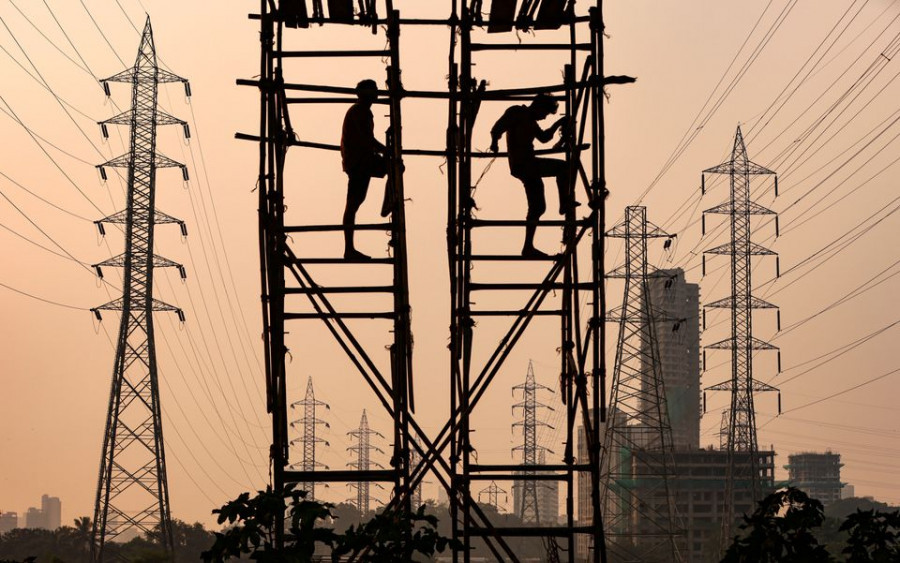
In a move that will make hydroelectricity generated by Indian projects cheaper than that produced by Nepal, India’s power ministry starting earlier this month removed the inter-state transmission charges for new Indian hydropower projects.
The ministry on December 2 issued the order to waive Inter-State Transmission System (ISTS) charges on the transmission of electricity generated by new hydropower projects. The waiver is already available to solar and wind power projects.
The move has, however, raised the hackles of Nepali officials and the private sector as this concession will not be applicable to the hydroelectricity exported by Nepal and result in Nepali power producers losing competitive edge in the Indian power market.
During the South Asia (BBIN) Power Summit organised by the Confederation of Indian Industries (CII) earlier this month, representatives of the Nepal government and the private sector raised concerns about the possible impact of the Indian policy on Nepali hydropower export.
Energy Secretary Dinesh Ghimire, Nepal Electricity Authority Managing Director Kul Man Ghising, Rastriya Prasaran Grid Company Chief Executive Officer Netra Prasad Gyawali and representatives of the private sector had taken part in the power summit.
Ghimire told the Post that they raised concerns about the competitive disadvantage Nepal’s power producers would face due to the Indian protectionist policy.
“We will also take up the issue at the upcoming meeting of the Joint Working Group and the Steering Committee Meeting on Energy Cooperation,” said Ghimire.
These are joint secretary and secretary-level mechanisms whose next meeting has been scheduled for late January, in New Delhi.
The Indian government has set an ambitious plan to generate 500GW from non-fossil energy-based sources by 2030. “Hydropower projects, being clean, green and sustainable, will be of paramount importance in our clean energy transition journey. They are also essential for the integration of solar and wind power, which are intermittent in nature,” India's power ministry said.
The Indian government had declared hydropower projects as a renewable source of power in March 2019. However, the waiver of inter-state transmission charges, provided to solar and wind projects, had not been extended to hydropower projects.
“In order to remove this discrepancy and to provide a level playing field to hydropower projects, the Ministry of Power, Government of India has now decided to extend the waiver of charges on the transmission of power from new hydropower projects, for which construction work is awarded and PPA is signed on or before June 30, 2025,” India's Power Ministry said. There will be 25 percent waiver of charge till June 2026, which will climb to 100 percent waiver by the end of June 2028.
The waiver or concessional charges shall be applicable for a period of 18 years from the date of commissioning of the hydro power plants, the Ministry added.
However, Nepali stakeholders said the decision would skew the field against Nepal’s hydropower.
“The Indian companies will get a transmission charge waiver in the range of 35-50 paisa (Indian currency) per unit,” said Kul Man Ghising, managing director of Nepal Electricity Authority, who was also present at the summit. “As this facility is not available to Nepal, it is disadvantageous for selling Nepal’s hydropower in the Indian market.”
India has allowed Nepal to sell 452.6MW of power generated by eight hydropower projects in India’s energy market. Currently, only the NEA has been selling power in the Indian market as the Nepali private sector has not been issued the licence to do so for the lack of legal provisions. But about half a dozen private sector companies have already applied for government permission to engage in power trade within and outside the country.
In fact, Nepal Power Exchange Limited, Nepal’s private sector power trading company, and India’s Manikaran Power Limited, signed a memorandum of understanding on energy trading in January this year.
As per the MoU, Manikaran has also agreed to purchase 500 MW of electricity from the Nepal Power Exchange Limited, in which the Indian company will also have a stake.
As the private sector has been seeking licences for power trade, the NEA sold electricity worth Rs11.16 billion to India beginning June, until it stopped the exports in the third week of December owing to falling production. Both the Nepal government and the private sector have expressed serious concerns over the new Indian decision.
The NEA aims to sell power worth Rs16 billion in the current fiscal year after resuming export in June next year. The outgoing Energy Minister Pampha Bhusal told parliament in June that there was a possibility of exporting more than Rs70 billion worth of electricity to India in the next five years.
But without being competitive in prices, it will be difficult for Nepal to sell power in the Indian market. Nepal has also been concerned over the Indian Power Ministry’s notification to the power distribution companies that they must purchase a certain portion of hydropower.
The notification issued in January last year and modified in July this year forces distribution companies to buy a certain percentage of hydropower from domestic hydropower projects, which do not apply to imported power.
As per the notification, a distribution company must have purchased 0.35 percent of the total power it distributes from hydropower projects in fiscal 2022-23, which should increase to 2.82 percent in fiscal 2029-30 when India aims to add 30,000MW of hydropower capacity through the compliance of this notification.
“Hydropower imported from outside India shall not be considered for meeting Hydropower Purchase Obligation (HPO),” the notification said.
Ashish Garg, vice-president of Independent Power Producers Association of Nepal (IPPAN) said if India also allowed distribution companies to purchase imported hydropower to meet the HPO requirement, Nepal’s hydropower could be sold on a larger scale.
“If India granted a waiver of inter-state transmission charges to imported hydropower as well, Nepal’s power exports would see a marked boost,” he added.












